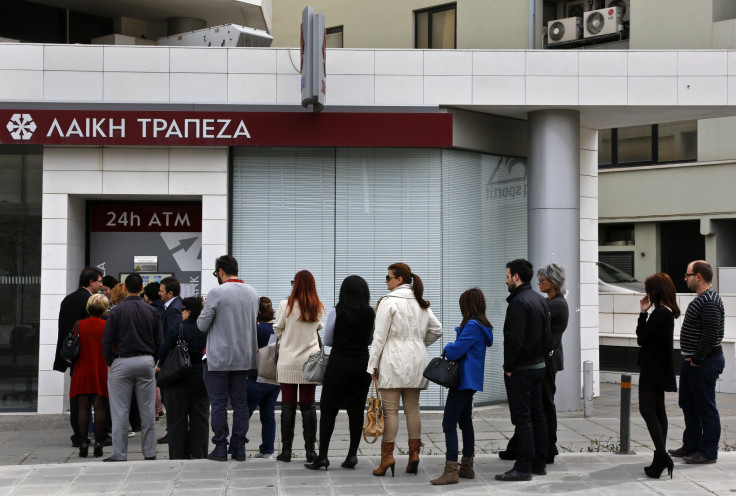Cyprus Keeps Calm And Carries On Amid Uncertainty Over Banking Crisis

The doors of Cyprus banks remain shut in a bid to stave off what would be an economically calamitous mass withdrawal of funds by panic-stricken depositors.
Cypriots are now limited to ATM withdrawals amounting to some four or five hundred euros per day with the majority of their savings kept out of reach. Some ATMs are no longer even issuing cash, and lines for the ones still operating have discouraged many people from even bothering to get their money out.
Elsa Skountlianou, a manager at the Hard Rock Café in the capital of Nicosia, said people are still coming into her restaurant and spending money.
“Business has changed a little bit,” she said. “It’s a little bit down.”
Her establishment is still accepting credit, while other businesses have resorted to a cash-only policy.
Skountlianou, 28, said she isn't too worried about her own finances. “I don’t have so much money in the bank,” she said, with a laugh.
From what she has observed in the capital, business is carrying on as usual for the most part -- people are out shopping, stores have supplies, no one seems to be panicking. Mostly, people are just wondering what’s happening.
“We cannot say many things -- we don’t know,” she said. “Everyday something changes, but I hope it will be alright.”
Still, the general feeling among the population seems to be one of uncertainty, frustration and anxiety as government ministers negotiate with European Union and Russian officials to reach a solution to the island nation’s banking crisis that may cost up to $17 billion to mitigate.
“Of course people are concerned,” said Andri Chassamboulli, professor of economics at the University of Cyprus. “The banks were supposed to reopen by now, but that probably won’t happen until next Tuesday.”
She added, “There isn’t much cash for people to stockpile, but they would if they could.”
The European Central Bank initially offered Cyprus a $13 billion bailout package that required a controversial 10 percent tax on bank deposits totaling more than 100,000 euros, to raise the remaining funds to prevent the banking system from collapse. A 6.5 percent tax was proposed for deposits below that amount.
The “deposit haircut” sparked outrage among average Cypriots who felt they were being punished for the risky practices of their financial institutions, and the Cypriot parliament responded by rejecting the bailout package as it stood.
“I don’t know why they [the ECB] are imposing such pressure, but I suspect it is political,” Chassamboulli said, referring to Russian interests in mitigating the crisis.
The Cypriot banking system has served as a tax haven for many Russian businesses, financial institutions and wealthy individuals, which account for about one-third of all deposits (30 billion euros), the BBC reported.
Moscow has been keen on avoiding the tax, which threatens the interests of its business sector, while EU powers, particularly Germany, have made it clear that they won't use taxpayer money to bail out wealthy Russians whose Cypriot bank accounts are suspected of having links to illicit activities.
At the same time, Cyprus is concerned that such heavy-handed measures will push away its Russian depositors, scaling down the size of its financial sector, which is precisely what the EU wants.
Andreas Theophanous, director of the Center for European and International Affairs at the University of Nicosia, said he believes the government will try to avoid the bank levy, but it isn't necessarily a foregone conclusion.
“It will be a compromise,” he said. “It should involve a voluntary participation of Cypriots, and may involve some Russian investment.”
Ideally, Theophanous would like to see a plan that gives Cyprus two to four years to pay for the remaining cost of the bailout, rather than an immediate tax on bank deposits.
“We need time to breathe,” he said. “I understand balancing a budget, but would it make sense to raise taxes and cut salaries in the middle of a recession?”
© Copyright IBTimes 2024. All rights reserved.




















